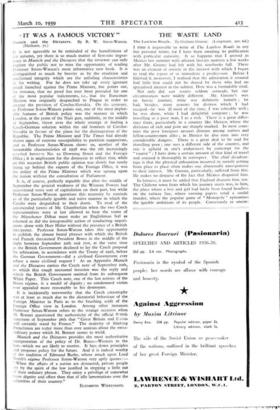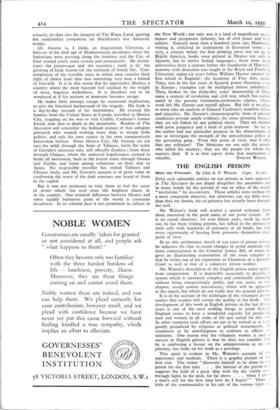THE WASTE LAND
The Lawless Roads. By Graham Greene. (Longmans. los. 6d.)
I FIND it impossible to write of The Lawless Roads in any but personal terms, for I have been awaiting its publication with particular curiosity. It so happens that I arrived in Mexico last summer with ulterior literary motives a few weeks after Mr. Greene had left with his notebooks full. There was an element of anxiety in the interest with which I began to read the report of so immediate a predecessor. Before I finished it, moreover, I realised that the admiration it aroused had little that could not be shared by those who had no specialised interest in the subject. Here was a formidable rival.
Not only did our routes seldom coincide, but our circumstances were widely different. Mr. Greene's was an heroic journey, mine was definitely homely ; he had, besides, many reasons for distress which I had escaped—he was ill most of the time, I was tolerably well ; he was alone, while I had delightful company ; he was travelling as a poor man, I as a rich. There is a great differ- ence there, particularly in a country like Mexico, where the divisions of rich and poor are sharply marked. In most coun- tries the poor foreigner arouses distrust among natives and fellow-countrymen alike ; in Mexico he also runs into very considerable dangers. There is a great deal to be said for travelling poor ; one sees a different side of the country, and one is upheld in one's endurances by contempt for the " tourist " ; I have done a certain amount of that kind of travel and enjoyed it thoroughly in retrospect. The chief disadvan- tage is that the physical exhaustion incurred in merely getting from place to place often makes one abnormally unresponsive to their interest. Mr. Greene, particularly, suffered from this. He makes no disguise of the fact that Mexico disgusted him.
In fairness, it must be added that England disgusts him, too. The Chiltern town from which his journey starts was, to him, the place where a boy and girl had lately been found headless on the railway line, where evening papers retail a sordid murder, where the popular game of " Monopoly " epitomises the ignoble ambitions of its people. Consciously or uncon-
sciously, he slips into the imagery of The Waste Land, quoting the unidentified companion on Shackleton's last Antarctic trudge.
Mr. Greene is, I think, an Augustinian Christian, a believer of the dark age of Mediterranean decadence when the barbarians were pressing along the frontiers and the City of God seemed yearly more remote and unattainable. He abomi- nates the picturesque and the eccentric ; earth is for the growing of food, houses for the rectitude of family life. Con- templation of the horrible ways in which men exercise their right of choice leads him into something very near a hatred of free-will. It is in this mood that he approaches Mexico, a country where the most buoyant feel crushed by the weight of sheer, hopeless wickedness. It is therefore not to be wondered at if his account at moments becomes savage.
He makes little attempt, except by occasional implication, to give the historical background of the tragedy. His book is a day-to-day account of his movements. He crossed the frontier from the United States at Laredo, travelled to Mexico City, stopping on the way to visit Cedillo, Cardenas's former friend, now shot to death in the mountains. Readers of The Spectator will remember the brilliant picture of that unhappy patriarch who wanted nothing more than to escape from politics and rule his own estates in his own comparatively benevolent fashion. From Mexico City, Mr. Greene set out into the wilds through the State of Tabasco, lately the scene of Garrido's atrocious rule, still officially Godless ; from there through Chiapas, where the universal hopelessness seemed to brake all movement, back to the tourist route through Oaxaca and Puebla, and home among volunteers on their way to Spain. No responsible traveller has visited Tabasco and Chiapas lately, and Mr. Greene's account is of great value in confirming the worst of the dark rumours one heard of them in the capital.
But it was not necessary to visit them to feel the sense of doom which lies over even the brightest places in in the country. One essential difference between Mexico and other equally barbarous parts of the world is conscious decadence. In its colonial days it was prominent in culture in
the New World ; not only was it a land of magnificent archi- tecture and prosperous industry, but of civil peace and high culture. Scarcely more than a hundred years ago, Humboldt, visiting it, criticised its institutions in European terms ; in 1575, a century before the first printing press was set up in British America, books were printed in Mexico not only in Spanish, but in twelve Indian languages ; there were three universities there a century before the foundation of Harvard ; anatomy with dissection was taught at the Royal and Pontifical University eighty-six years before William Hunter opened the first school in England ; the Academy of Fine Arts, under Tolsa, was in the last years of Spanish power illustrious even in Europe ; examples can be multiplied almost indefinitely. Then, broken by the thirty-five years' dictatorship of Diaz, came a century of revolution and civil war, which has culmi- nated in the present totalitarian-proletarian regime, whose work left Mr. Greene and myself aghast. But this is no place to enter into an analysis of General Cardenas's manifest follies and iniquities. Mr. Greene's cinematographic shots of present conditions provide ample evidence, the more damning because they are not linked by any political thesis. They are written with great pungency and a kind of grim humour. So far as the author had any particular purpose in his observations, it was to investigate the strength of the anti-religious policy of the governing gang. From this point of view, may I offer him one reflexion? The Mexicans are not only the people who killed the martyrs ; they are the people for whom the martyrs died. It is in that aspect alone that martyrdom is











































 Previous page
Previous page